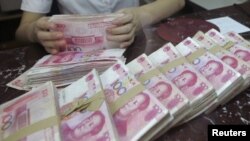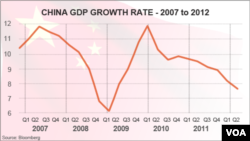BEIJING – As the United States and Europe work to recover from their own economic crises, China has been one of the world's bright spots. But recent figures show that the country's fast economic growth is slowing.
Days ago, Chinese Premier Wen Jiabao signaled that the country's top leadership is concerned about an impending economic slowdown. He urged the government to implement policies to offset the “huge downward pressure” on the Chinese economy.
His comments foreshadowed China's second quarter growth figures for this year, which were announced Friday by National Bureau of Statistics spokesman Sheng Laiyun.
Sheng says China's economy grew by 7.8 percent for the first half of this year. Meanwhile, he says the economic growth rate for the second quarter of this year slowed from 8.1 percent in the first quarter to 7.6 percent.
He acknowledges that this is the first time in three years that China's GDP growth rate has dipped below eight percent, but adds he does not think it is a bad thing.
He acknowledges that this is the first time in three years that China's GDP growth rate has dipped below eight percent, but adds he does not think it is a bad thing.
According to Sheng, people should not only focus on the numbers, but also take into account unspecified domestic and external factors. From this perspective, he says China's economy has maintained what he described as steady growth.
Song Hong, a trade expert at the Chinese Academy of Social Sciences, says the pressure the Chinese premier was talking about is partially due to China's diminished trade figures, which he blames on European debt woes and the 2011 Japanese earthquake. At the same time, he says he thinks domestic demand in China will continue to increase and will help pull the whole economy up.
Song says the demand for things like oil and cars is still increasing rapidly, and that Chinese consumer demand will be, "faster than any government stimulus measures to increase imports".
The latest growth figures are China's lowest since the 2008 global financial crisis, but they are still higher than the official annual target of 7.5 percent.
Stephen Green, of Standard Chartered Bank, says he thinks the Chinese government has been taking short-term steps to try to avoid a hard economic landing.
“These kinds of measures - cutting interest rates, doing infrastructure spending, more money in infrastructure - should help to stabilize the economy," noted Green. "And we think by some time around August, September, we will be seeing clearer signs that the economy is stabilized and is beginning to grow faster.”
He adds, though, that the Chinese economy needs to undergo more extensive reforms if it wants stronger and more sustainable growth. He says one major challenge will be reducing the presence of state-owned companies in industries across the board - including transportation, finance and health care.
“It's like opening a door to a room, inviting the private sector to come in, and then seeing that these enormous elephants are in that room and there is no way to actually come in, because big state companies are actually dominating these sectors," Green said. "So what we would love to see is more aggressive moves - I personally think that if you are really serious about the private sector being involved in rail, or roads, or hospitals, you are going to have to see the state sector start selling some assets to create some space for the private sector to get involved.”
China's government has noted international concerns over its economic slowdown, but is not alarmed.
Earlier this week, Foreign Ministry spokesman Liu Weimin said some estimates are positive and some are negative, but not all are accurate.
Liu adds that the Chinese government will always implement macroeconomic policy coordination and regulations according to the actual conditions for the economy.
He also hinted that the slowing is deliberate. He said these days, when it comes to the Chinese economy, the government is “now putting more emphasis on quality, rather than quantity.”





